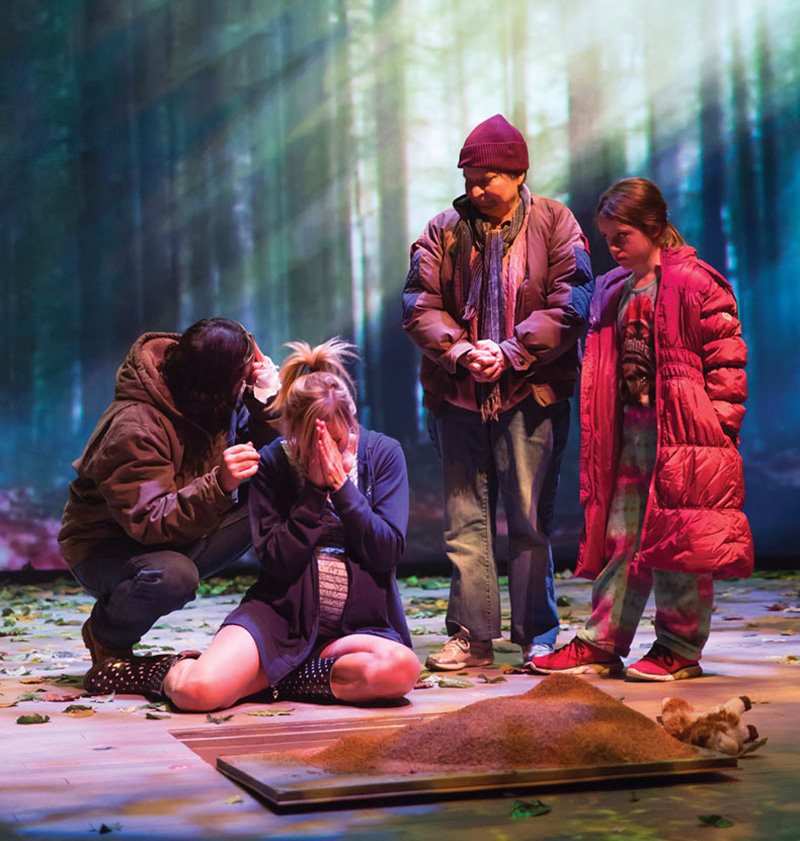
In Baby Screams Miracle, a young woman journeys across a mountain pass to see her estranged family after they have been beset by a strange storm. As the storm returns and wreaks further damage on their house, they seek shelter in their fragile bonds and faith. Playwright Clare Barron spoke to Woolly Mammoth Theatre Company Literary Director Kirsten Bowen about the genesis of the play and the mysteries that lie at the heart of it.
Where did Baby Screams Miracle come from?
I grew up in a small city in eastern Washington State, and Christianity was pretty much the default in that community. When I went away to school and then became a hedonistic young actress living in New York, I very classically lost touch with my religion. And I remember thinking that my friends from back home who were still very religious seemed so much more genuinely fulfilled and happier than I was, and seemed to be finding meaning in their lives that I was missing. And so, I started to write the play as an investigation into that loss.
Ironically, I don’t think that these characters, although religious, are particularly happy people! They are searching for meaning, happiness, and connection, but they’re coming up short a lot of the time. The play ultimately became less about “Religion” with a capital “R” and more about this human impulse to search for something meaningful in what can feel like a relentlessly brutal and senseless world — and to attempt to do it with humor and grace. It also asks what role family plays in that search. How close do you actually want to be to your parents? What happens when your darkest, most private thoughts get exposed? And what is the relationship between these base impulses and the profound?
So would you call this a “family play?”
In a sense this play is an “American Family Play.” We’ve been trained to identify how those plays work: a family is reunited under difficult or strange circumstances and someone has a big dark secret. At some point that secret is exposed, there’s a huge fight, and a resolution. And I find that so not true to how families actually operate. I do think there’s often a dark undercurrent to families, but I think that most of the time it’s made of a million little hurts, grievances, strange dynamics, and you can never quite put a finger on it. I tried to honor that ambiguity in this play. These are characters who want to connect, but don’t quite know how, or who are angry but don’t know how to articulate their anger. This failure of language, and this inability to articulate or make sense of our experience, seems to me a crucial tenet of being a human being, and also something that theater is particularly equipped to explore.
Tell us more about the world the family inhabits.
Eastern Washington is the opposite of everything everybody always thinks about Washington state, which is normally based around perceptions of Seattle. It’s a desert, very agricultural, very Christian, it tends to be very Republican — at least it was when I was growing up. The play takes place in a small, economically depressed community, which is pretty isolated. As a result, the people have a real relationship with nature. Both its pleasures and its terrors. Where I grew up, you’d hear about people who died driving across the mountain pass, or people who drowned in lakes, or people who died in avalanches. You’re aware of nature as a chaotic and uncaring power. Something that can literally kill you. But at the same time, you’re equipped to be in nature and enjoy it. You go hiking, swimming, and skiing on a regular basis. You know how to build things with your hands. It’s a very intimate relationship with the natural world, both its dark and beautiful sides.
For me, there is a real spookiness and mysticism in the Pacific Northwest, and the play operates in a spooky kind of world. There’s something surreal about it. And there’s also something almost biblical, where things are more extreme. I think it’s important to release some of the naturalism of the setting and the language, and encounter the play on a more poetic level where everything isn’t quite literal.
What does the title of the play mean? How did you come up with it?
The title of the play is a bit of a Rorschach test for the audience. For me, it references the unborn children — the family’s next generation — who are present in the play via the women’s pregnancies, but rarely spoken of. I’m also toying with this question of what counts as a miracle. And if a miracle can be horrifying, scary or painful. Some people see miracles everywhere: You have a baby! It’s a miracle! You survive cancer! It’s a miracle! Other people are more skeptical. A friend once told me: “If a man falls from a 10-story building and survives, that’s not a miracle. He has to stop, mid-air, 10-feet above the ground. The laws of physics must be suspended!” I think it’s a very personal and mysterious term.
Have you since found what you were missing when you began Baby Screams Miracle?
No! I think it’s a life-long quest, and I’m still looking for it in God, in religion, in relationships, in nature, and also in theatre. Theatre has become a new kind of church for me — a place of spiritual gathering and a community space. I had this realization at a church service one Christmas when I was home that it didn’t matter if the sermon was good, or if I liked the priest, I was constantly looking for meaning throughout the service. I was searching for things that resonated with my personal life, or sparked questions I was interested in. I wasn’t seeing the service with an evaluative eye, I was seeing it with a searching eye. It was a way of leaning forward as an “audience member.” So often we watch a play while leaning back, with our arms crossed like, “impress me, show me what you’ve got.” One of my big projects as a playwright is to welcome audiences and make them feel the way I do at a spiritual service so that they feel inspired to lean forward, to meditate, and to take what beauty and meaning from it they can.
Baby Screams Miracle by Clare Barron, directed by Howard Shalwitz, ran at Woolly Mammoth Theatre Company in Washington, DC from January 30-February 26, 2017. Interview reprinted by permission of Woolly Mammoth Theatre Company.
Reprint with permission from Woolly Mammoth Theatre Company.
To purchase a copy of Baby Screams Miracle click here, and to learn more about licensing a production, click here.

Newly Available for Licensing – January 2026 (US)

Comedy Mysteries: Gasps, Laughs and Thrills

